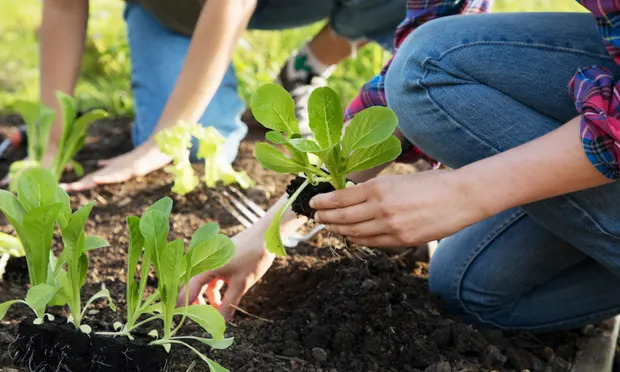Recent research suggests plants may be able to learn and communicate. This really put me off my baked potato.
 Plant intelligence … salad seedlings being dug in at an allotment. Photograph: Betsie Van der Meer/Getty Images
Plant intelligence … salad seedlings being dug in at an allotment. Photograph: Betsie Van der Meer/Getty Images

By Emma Beddington
Last modified on 2023 Jan 16
–
If you were starting to polish your Veganuary halo, sorry, I have upsetting news, gleaned from a Radio 4 program called Is Eating Plants Wrong?. Spoiler alert: maybe.
Plants, it explained, “can sense the world around them, learn, remember and engage in complex communication with the species around them”. Research suggests that pea seedlings can learn to associate a sound with the light they need and choose to grow in a particular direction as a result. They can also eavesdrop on each other and protect themselves based on what they “hear”. Sagebrush plants communicate to each other the risk of being chomped by insects and trees share nutrients through what Prof Suzanne Simard pleasingly calls the “wood wide web”; they do so more with trees they are related to than with “strangers”.
Do plants show intelligence? “Definitely, yes – I don’t see any problem with this,” replied one interviewee on the program, putting me off my baked potato and raising fears about what the houseplants my son unwisely left in my care are saying about me behind my back.
It is a head-spinning indication of how much we still have to learn about the world. The really knotty question, though, is what is left for a would-be ethical eater’s lunch? Ethical fruitarianism – eating only the parts of plants that detach harmlessly, causing no damage – might meet the standards of the Federal Ethics Committee on Non-Human Biotechnology (which has ruled that plants have the right to be protected from undue harm).
But what could we eat at this time of year under that regime: nuts? Wouldn’t we be depriving squirrels? Lab-created meat is still at the experimental stage and costs more than a Salt Bae gold-sprinkled steak, but is roadkill allowed? I would say breatharianism – only “eating” air – is due a revival, but it is mad, dangerous and probably a cult, so no. Alternatively, we could fly in the face of decades of medical advice and stick to stuff with no discernible relationship to anything living: the Irn-Bru diet?
My last option: learn to photosynthesize. If they are so clever, perhaps plants can teach us.
Topics
Most viewed
- –
- –
- –
- –
- –













